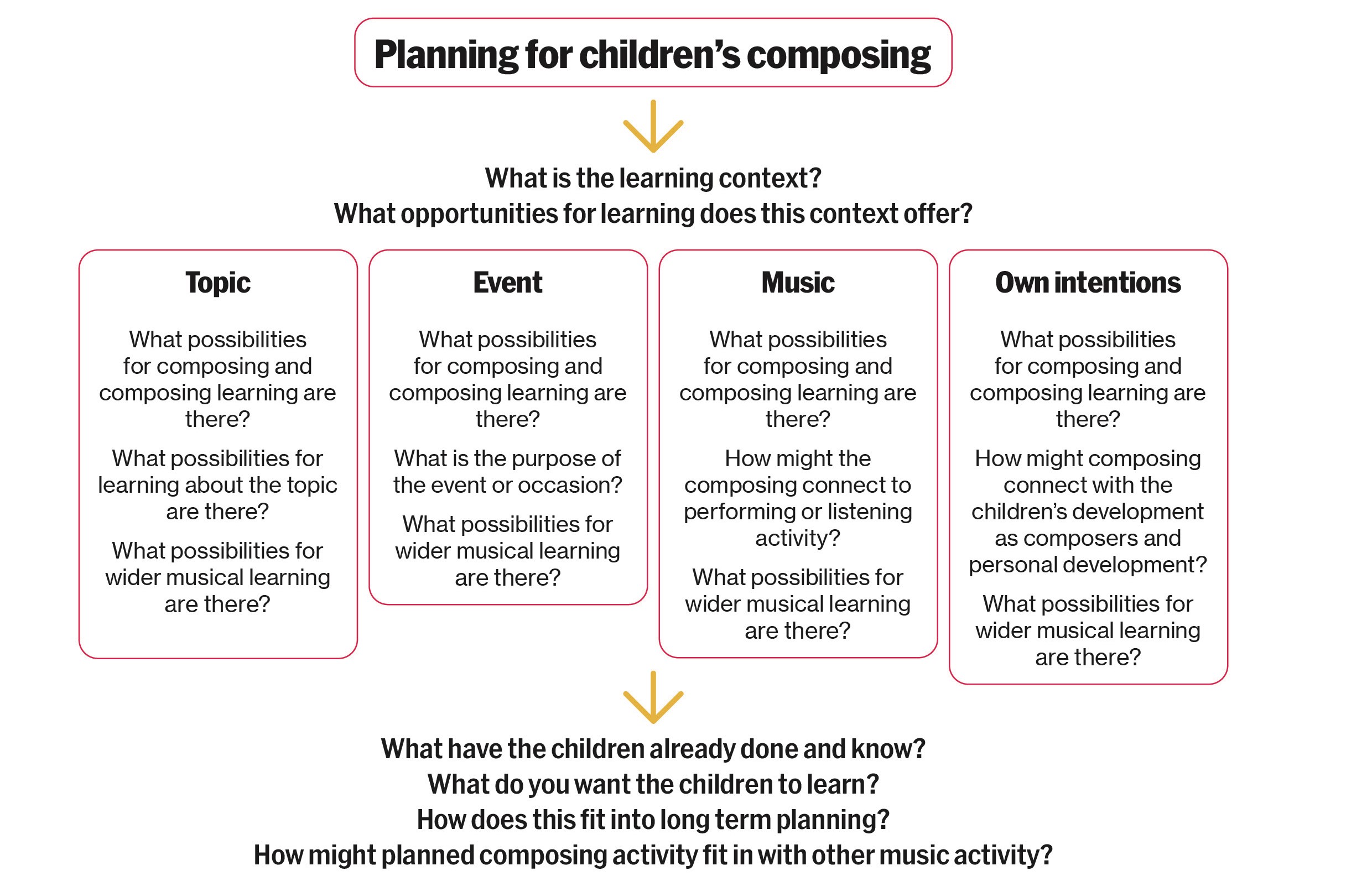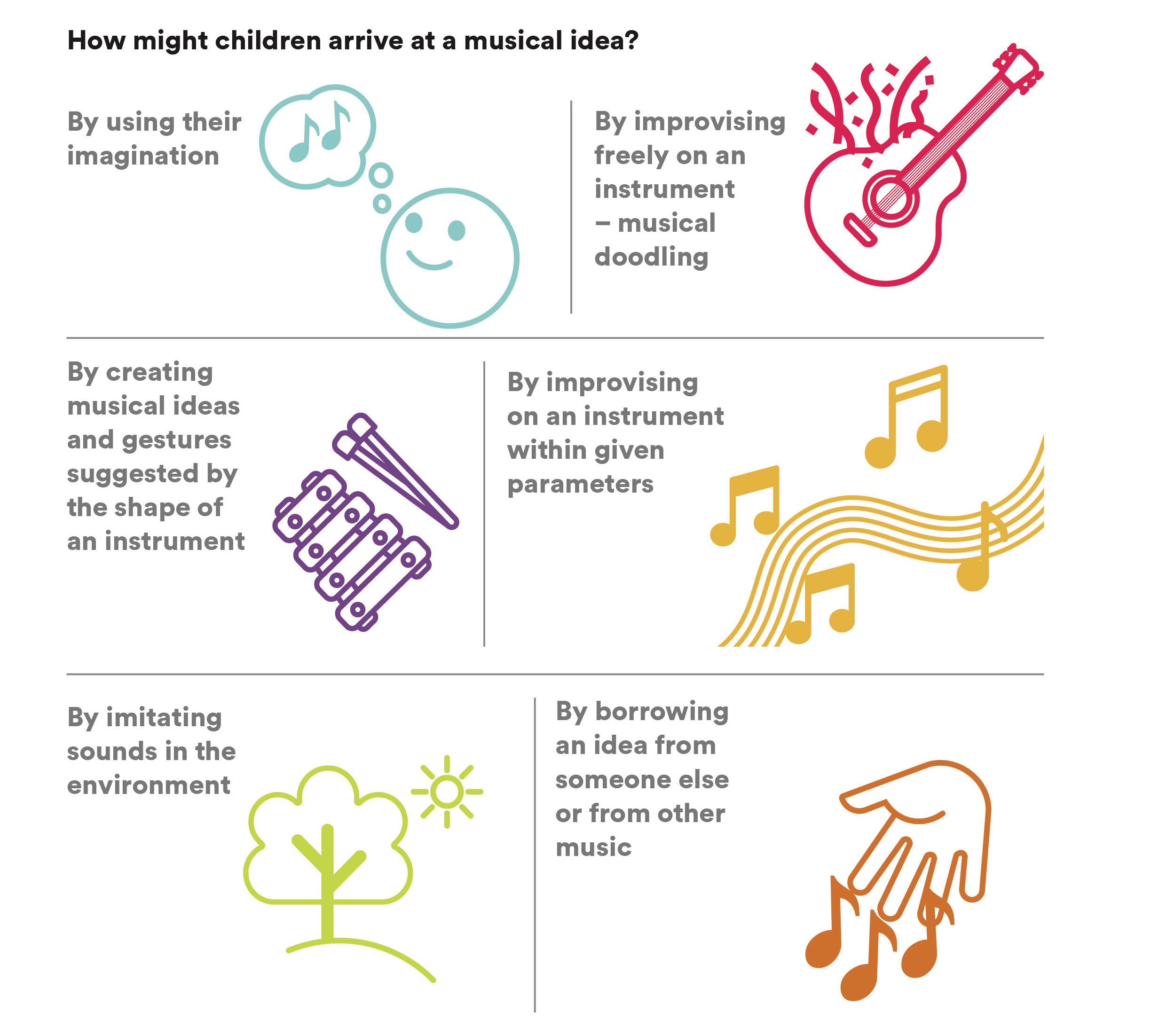
For many years now, Birmingham Contemporary Music Group (BCMG) and Birmingham City University (BCU) have been cooperating, working with children and young people composing music and researching this. LICP evolved from a myriad of previous composing projects, including a secondary-age iteration of LIC and projects out of school. It is one of very few longitudinal projects or studies of children composing in primary schools in the UK or elsewhere.
Funded by the Paul Hamlyn Foundation, LICP was a collaboration between BCMG, BCU, Sound and Music, Birmingham Music Education Partnership, Bristol Beacon and the participating schools. It was a two-year action research project in primary schools in Birmingham and Bristol, involving nine composers working in eight schools. They worked alongside class teachers and school music leads to support 480 children, initially in Year 4 and then in Year 5, to compose music.
Core aims and research
There were three core aims:
- To work with teachers and composers to develop meaningful and relevant composing activities for children. This meant composing activities that worked for a school and its children and went beyond ‘painting-by-numbers’, to be an exercise in which all children engaged in high-level ‘composerly thinking and doing’.
- To better understand children's composing and their progress as composers.
- To improve the quality and frequency of composing in primary schools – something that was identified by the participating schools as needing development.
There were four main research questions:
- What can we learn about children in Years 4 and 5 as composers?
- What does it mean to make progress as a composer in the primary classroom?
- How do we structure activities, lessons and schemes of work to support children's learning and progress in composing?
- What pedagogies support children learning and progressing as composers?
First principles
LICP was established with a number of parameters already in place, from ideas that had arisen in previous work. We were very clear that LICP was to be exploratory, designed to find out more about composing pedagogies in what might be termed ‘normal’ primary schools. This referred to schools with generalist classroom teachers rather than music specialists, which was likely to be the case in most schools.
We were also clear that this work involved composing pedagogies; it was not a ‘Let's-put-on-a-show’ project, which all-too-often represents composing work with children and young people. There were performances, certainly, but we did not work backwards from a performance to the preparation for it; we worked forwards from teaching composing. This, we felt, was an important aspect of LICP, and one which we were careful to inculcate in all the adult participants.
Often, children's composing projects happen in rarefied environments, with large or additional space(s) and/or with self-selecting groups of children. This project, instead, sought to develop high-quality practice in the context of real classrooms; practice that could be replicated by generalist teachers, with the sonic resources available to them, and integrated into music curriculum development.
Training and support
While following these principles, LICP did not just send composers into schools; rather, there was considerable CPD underpinning the work of composers and teachers. This included five full-days of composer professional development, which focused on working effectively with schools, teachers and curricula, and six days of seminars in which teachers, composers and researchers shared experiences, findings and expertise, and discussed pedagogies and practices. Built into the schedule were regular meetings between composers and the schools' music leads (along with key music hub contacts), to ensure integration with future curriculum planning; post-session teacher/composer reflection meetings; specialist mentoring; and peer-buddying for composers.
As the project was designed to run over two school years, in the second year there was built-in support for Year 4 teachers to deliver similar activity with their new classes.
What the children actually did in each school was decided by the composer/teacher partnerships, and discussed with the LICP coordinating team. We were keen for composers to work with the reality of the children and resources available to them in each school. Crucial to the project was a focus on supporting children to create their own music. As we know, every school is different, has different resources, as well as different structures, and, of course, the youngsters are different too!
Toolkit
All this work was supported by a Planning, Reflection and Progression Toolkit that pulled together our thinking from previous projects. This gave LICP consistency and coherence, while allowing flexibility and responsiveness for each school, and for the skills and experience of each composer.
The toolkit takes generalist teachers through thinking and planning for composing with their classes. It is not intended to be an off-the-shelf resource, though, for the reasons stated earlier. What it does is provide a reflective planning framework, as in Planning for children's composing, one of the many diagrams used (courtesy Keith Dodds).
First part of the creative process, below, is another example, this time designed to help children arrive at a musical idea.
Newly revised, the toolkit is now published as a free downloadable PDF, or as a hardcopy that can be purchased from the BCMG website.
Reaction
The toolkit is only one output from LICP, but a very tangible one. We know that it has had significant impact on children, teachers, schools and composers on the development of practice and pedagogy. Some comments from the children showed interesting aspects of their thinking, and teachers, too, had some important things to say, particularly considering how they were generalists by and large.
Children's observations:
- ‘You kind of feel this incredible feeling that just rushes through here [pointing to heart].’
- ‘Composing isn't always easy, because before the lessons, I thought composers just threw a couple of notes in and then you made a song. But when doing the lessons, I learned it's not that – you have to focus on lots of different bits at a time.’
Teachers' observations:
- ‘It has made me realise how much emphasis was previously given to the performance aspect of music, and although there were elements of composition, these were very structured and scaffolded, and limited children's creativity. Listen Imagine Compose Primary has completely thrown open the gates of what musical learning could be, and our music curriculum has far more opportunities for children to develop their composerly thinking and build on this over time. Although there might be guides and scaffolds in place, children have more opportunities to take their compositions in their own direction.’
- ‘Children are a lot more creative than they often get credit for, and if they are given an exciting brief, with lots of opportunities to test and try out their ideas, they will do all of the hard work themselves!’
- ‘I've learnt how important sound is in a classroom. Teachers are taught to try their best to maintain silence. This allowed me to realise that sounds/music is a form of expression and learning. It has a place in the classroom.’
Over the project's two years, the children composed for voices, body-percussion, found-objects and classroom percussion, and with software/apps such Soundtrap, BandLab or Chrome Music Lab. They composed for school ensembles, instruments they were learning, professional musicians, and even the carillon! They were inspired by topics as diverse as fossil-hunting, the Vikings, the water cycle and Kandinsky, and music that included Bach's Goldberg Variations, Holst's The Planets, ‘We don't talk about Bruno’ from Encanto, and Stripsody by Cathy Berberian.
LICP is not over, though, and there is much more to come. If you, your school or music hub are interested in CPD for teachers based on the toolkit and other project learning, please get in touch.




